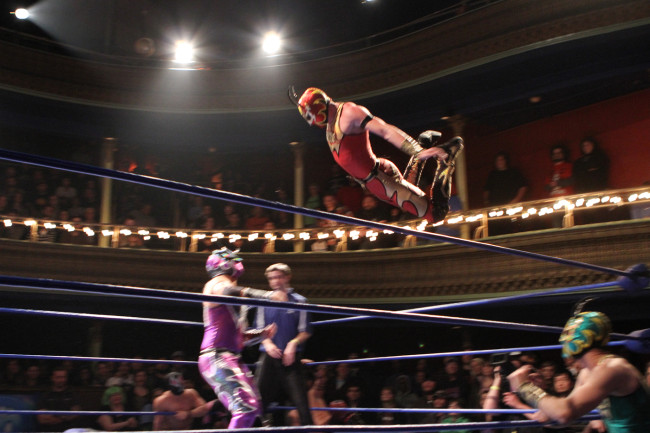Are Cirque du Soleil and Philadelphia wrestling promotion CHIKARA spiritual cousins?

Global juggernaut Cirque du Soleil has revolutionized the circus arts in the last three decades, but it had less lofty aspirations at its start. Street performer, accordionist, and fire-breather Guy Laliberté joined forces with Gilles Ste-Croix and Daniel Gauthier after leaving college, and the earliest incarnations of what would one day be Cirque started marching across Quebec in 1980 (quite literally “marching” – as part of a publicity stunt, Ste-Croix walked 56 miles on stilts to the province’s capital). Their early years saw them teeter on the brink of bankruptcy, while the recipe for modern Cirque performances was tested with various ingredients by artistic director Guy Caron and theater director Franco Dragone, with more than a pinch of influence from the Moscow Circus.
This tale of a college dropout learning some niche performance skills, touring around with friends and cultivating a unique style, before launching an organization that would go on to represent the avant-garde of its medium is not one-of-a-kind. This is the story of CHIKARA, as much as it is the story of CHIKARA’s spiritual predecessor, Cirque du Soleil. On the surface, Cirque du Soleil and CHIKARA share some obvious ground – highly trained performers in outrageous costumes showing off their freakish physical abilities to awe their patrons – but behind the curtain, there’s more to that story.
Often described as a “comic book come to life,” CHIKARA is professional wrestling as performance art, and if using boundary-shattering creativity as a metric, then CHIKARA has found success well beyond what its humble following indicates. The Philadelphia-based troupe tours the U.S. and U.K., but their zany, vibrant, and gender-blind take on the all-too-often misogynistic world of pro-wrestling has earned them a global fan base. Founder and director Mike Quackenbush weaves layered, nuanced stories throughout CHIKARA’s live events – some that resolve quickly, others playing out over years or “seasons” of the show. Much like Laliberté and company transformed big top circus acts into magical fairytales, Quackenbush has evolved the grunt and groan game into a superhero spectacle.
“Just prior to the first CHIKARA event, I saw [Cirque’s] La Nouba in Orlando… and I say this free of hyperbole: it changed my life,” Quackenbush offers. “I saw a circus when I was just a kid. I had certain notions about what ‘circus’ meant, and then I saw this gorgeous reinvention of that notion. It was so far removed from my personal definition of ‘circus’ that it was basically a new concept unto itself.”
Since then, Quackenbush says he’s seen more than a dozen Cirque du Soleil shows and remains an ardent fan of the group. “In some form or fashion, I want to be nourished by live performance. I always take that away from a Cirque show. It nourishes the soul, it excites my imagination, it renews my sense of wonder in the world. I try to go at least once a year. It serves as a really salient reminder of what I want to give to CHIKARA’s audience. Imagination. Wonder. Joy.”
The spirit of Cirque du Soleil has obviously shaped CHIKARA, which, more than any other organization in the game, has tried to elevate the art form from its humble, street-level roots.
“My parents could not mask their contempt for the circus. In their minds, these were carnies and gypsies that didn’t care for the animals and ran crooked games of skill. You only have to set foot in Cirque’s Grand Chapiteau to have those ideas erased from your brain,” Quackenbush adds.
Last year, Cirque du Soleil generated an estimated $800 million in ticket revenue, while CHIKARA is nowhere near that level of dominance. But in their tiny training center, The Wrestle Factory, the same sparks of imagination and restless ambition manifest themselves amongst the muscular, masked performers and their mentor, the team’s mastermind.
“Cirque’s influence on CHIKARA runs deep. Right into our DNA,” Quackenbush says. “In some ways, we are distant cousins.”
Guest article by Aaron Thomas


